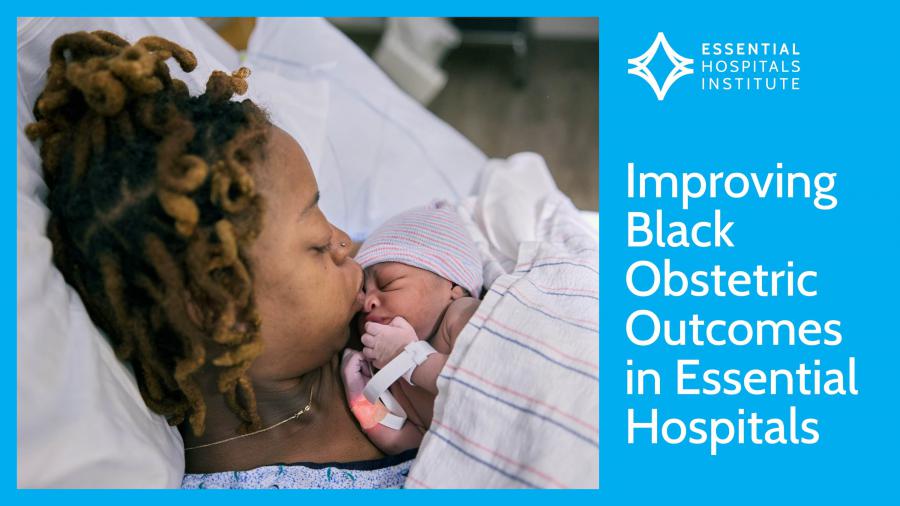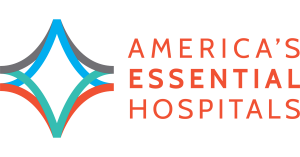
Report: Hospitals Target Hypertension, Hemorrhage to Improve Black Obstetric Outcomes
Efforts to reduce hypertension and hemorrhage in Black obstetric patients improved outcomes at hospitals providing safety net care.
WASHINGTON, D.C., UNITED STATES, January 31, 2024 /EINPresswire.com/ -- Focused efforts to reduce hypertension and hemorrhage in Black obstetric patients—including those to enhance equity and mitigate the effects of structural racism—improved outcomes at hospitals providing safety net care, a new report from Essential Hospitals Institute shows.
The Institute, the research, education, dissemination, and leadership development arm of America’s Essential Hospitals, with funding from the CVS Health Foundation, led a two-year learning collaborative to support work at 12 essential hospitals to reduce morbidity and mortality among Black pregnant and birthing patients. The collaborative supported sharing of results and best practices among the hospitals, including:
• Alameda Health System Foundation, Highland Hospital, in Oakland, Calif.
• Broward Health, in Fort Lauderdale, Fla.
• Grady Memorial Hospital, in Atlanta.
• JPS Health Network, in Fort Worth, Texas.
• MedStar Washington Hospital Center, in Washington, D.C.
• Memorial Healthcare System, in Hollywood, Fla.
• Orlando Health Winnie Palmer Hospital, in Orlando, Fla.
• SUNY Downstate Health Sciences University, in Brooklyn, N.Y.
• Temple University Hospital, in Philadelphia.
• University of California, San Diego Health, in San Diego.
• UW Medical Center—Montlake, in Seattle.
• Women & Infants Hospital of Rhode Island, in Providence, R.I.
According to the Centers for Disease Control and Prevention, Black birthing people are more than two and a half times likelier to die from a pregnancy-related cause than white birthing people. Racial and ethnic disparities in maternal mortality persist across socioeconomic strata. The pregnancy-related mortality ratio for Black birthing individuals with at least a college degree was five times as high as white birthing individuals with similar education. Members of America’s Essential Hospitals serve counties in which maternal mortality rates can exceed 52 maternal deaths per 100,000 live births.
Participating hospitals took a variety of successful approaches to improving Black obstetric outcomes, including providing racially concordant group prenatal care to reduce structural racism, expanding required trainings for all obstetric providers to include hypertension emergency simulations and anti-racism training, and providing enhanced wraparound services to meet social needs.
The report, Improving Black Obstetric Outcomes in Essential Hospitals, details each of the projects and the grantee’s perspectives on their work. It offers four recommendations to hospitals undertaking similar work:
• Build a culture of equity at the institutional level.
• Connect program activities to quality improvement initiatives.
• Invest in health equity data training for program staff.
• Establish trusting and lasting partnerships.
“This research shows that institutional commitment to equity is key to providing safer care for Black birthing patients,” says Kalpana Ramiah, DrPH, MSc, Institute director and vice president of innovation for America’s Essential Hospitals. “We hope it can serve as a model to other hospitals exploring this work.”
Improving Black Obstetric Outcomes in Essential Hospitals is available for download on the America’s Essential Hospitals website.
Carl Graziano
America's Essential Hospitals
+ +1 202.585.0102
cgraziano@essentialhospitals.org
Visit us on social media:
Facebook
Twitter
LinkedIn
YouTube
EIN Presswire does not exercise editorial control over third-party content provided, uploaded, published, or distributed by users of EIN Presswire. We are a distributor, not a publisher, of 3rd party content. Such content may contain the views, opinions, statements, offers, and other material of the respective users, suppliers, participants, or authors.




